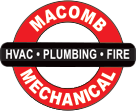Fires cause over 11 billion dollars in losses in the United States every year. Selecting the right fire suppression system and scheduling regular tests, inspections, and service can save you from contributing to that number. Our experienced and dedicated designers and technicians can help you choose the right system for your facility and implement it in the most effective way possible considering your unique needs and special hazards.
Four things must be present to produce a fire:
- Oxygen
- Fuel
- Heat of ignition
- Uninterrupted chemical chain reaction
All fire suppression agents seek to remove one or more items from the list above.
There are several factors to consider when choosing the best fire protection system for your facility. Some of these include the facility type, size, interior design, available water source, and hazard types. Below is a summary of the classification of fires. Fires that involve materials other than common combustibles are considered special hazards and require special attention when planning, installing, and maintaining a fire protection system.
- Class A: Involve common combustibles and commonly occur in typical residential and commercial properties.
- Class B: Involve flammable liquids and synthetic or oil-based materials. Often spread quickly and can reignite after extinguished if not properly suppressed.
- Class C:Involve electrical equipment including computers, servers, and appliances and often take place in areas that are not easily accessible.
- Class D: Involve combustible metals and require a specialty dry suppression agent in order to extinguish.
- Class K: Involve combustible cooking materials like oil and grease and typically occur in commercial kitchens.
Our Fire Protection Systems:
- Wet System
- Dry System
- Special Hazard Systems
- Pre-Action System
- In Rack Sprinkler System
- Deluge Sprinkler System
- Early Suppression Fast Response (ESFR) System
Macomb Mechanical Fire Protection is prepared to help you choose and install the ideal fire suppression system for your facility. We are also experienced in servicing many types of suppression systems and conducting test and inspections that comply with NFPA regulations.
Contact us today to schedule your system inspection or maintenance, or to speak with one of our knowledgeable technicians or designers about implementing a new fire suppression system in your facility.
